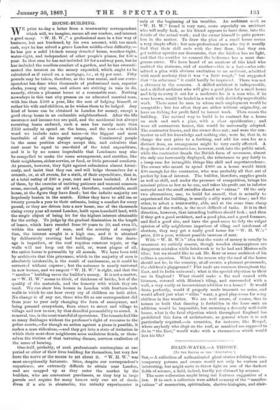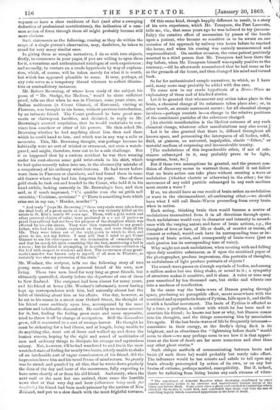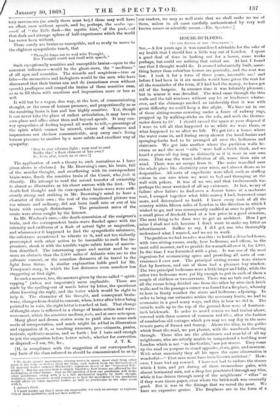BRAIN-WAVES.—A THEORY.
[TO ills EDITOR OF TUE "SPECTATOR:1 SIR, —A collection of authenticated ghost stories relating to contemporary persons and events would not only be curious and interesting, but might serve to throw light on one of the darkest fields of science, a field, indeed, hardly yet claimed by science.
The mere collocation might bring out features suggestive of a law. If to such a collection were added so many of the "manifestations" of mesmerists, spiritualists, electro-biologists, and clair
voyants as have a clear residuum of fact (and after a sweeping deduction of professional contributions), the indication of a common action of force through them all might probably become still more obvious.
Such statements as the following, coming as they do within the scope of a single person's observation, may, doubtless, be taken to stand for very many similar ones.
In giving them as sample narratives, I do so with two objects, firstly, to commence in your pages, if you are willing to open them for it, a veracious and authenticated catalogue of such experiences ; and secondly, to venture on a crude hypothesis by way of explanation, which, of course, will be taken merely for what it is worth, but which has appeared plausible to some. It may, perhaps, at any rate serve as a temporary thread whereon to collect illustrative or contradictory instances.
Mr. Robert Browning, of whose keen study of the subject his poem of "Mr. Sludge, the Medium," would be alone sufficient proof, tells me that when he was in Florence, some years since, an Italian nobleman (a Count (iinnasi, of Ravenna), visiting at Florence, was brought to his house, without previous introduction, by an intimate friend. The Count professed to have great mesmeric or clairvoyant faculties, and declared, in reply to Mr. Browning's avowed scepticism, that he would undertake to convince him somehow or other of his powers. Ile then asked Mr. Browning whether he had anything about him then and there which he could hand to him, and which was in any way a relic or memento. This, Mr. Browning thought, was perhaps because he habitually wore no sort of trinket or ornament, not even a watchguard, and might, therefore, turn out to be a safe challenge. But it so happened that by a curious accident he was then wearing under his coat-sleeves some gold wrist-studs to his shirt, which he had quite recently taken into use, in the absence (by mistake of a sempstress) of his ordinary wrist-buttons. He had never before worn them in Florence or elsewhere, and had found them in some old drawer where they had lain forgotten for years. One of these gold studs he took out and handed to the Count, who held it in his hand awhile, looking earnestly in Mr. Browning's face, and then said, as if much impressed, " C'e qualche cosa che ted grida nell orecchio, Uccisione, uccisioner " ("There is something here which cries out in my ear, Murder, murder!' ") "And truly" [says Mr. Browning.] "those very studs wore taken from the dead body of a great-uncle of mine, who was violently killed on his estate in St. Kitt's, nearly 80 years ago. These, with a gold watch and other personal objects of value, were produced in a c nit of justice as proof that robbery had not been the purpose of the slaughter which was effected by his own slaves. They were then transmitted to my grandfather, who had his initials engraved on them, and wore them all his life. They wore taken out of the night-gown in which he died, and given to me, not my father. I may add, that I tried to get Count Ginnasi to use his clairvoyance on this termination of ownership also ; and that he nearly hit upon something like the fact, mentioning a bed in a room ; but he failed in attempting to describe the room—situation ofq the bed with respect to windows and door. The occurrence of my greatuncle's murder was known only to myself, of all men in Florence, as certainly was also my possession of the studs."
Mr. Woolner, the sculptor, tells me the following story of two young men,—one of them a personal friend of his own, now living. These two men lived for very long as great friends, but ultimately quarrelled, shortly before the departure of one of them to New Zealand. The emigrant had been absent for many years, and his friend at home (Mr. Woolner's informant), never having kept up correspondence with him, had naturally almost lost the habit of thinking about him or his affairs. One day, however, as he sat in his rooms in a street near Oxford Street, the thought of his friend came suddenly upon him, accompanied by the most restless and indefinable discomfort. He could by no means account for it, but, finding the feeling grow more and more oppressive, tried to throw it off by change of occupation. Still the discomfort grew, till it amounted to a sort of strange horror. He thought he must be sickening for a bad illness, and at length, being unable to do anything else, went out of doors and walked up and down the busiest streets, hoping by the sight and sound of multitudes of men and ordinary things to dissipate his strange and mysterious misery. Not, however, till he had wandered to and fro in the most wretched state of feeling for nearly two hours, utterly unable to shake off an intolerable sort of vague consciousness of his friend, did the impression leave him and his usual frame of mind return. So greatly was he struck and puzzled by all this, that he wrote down precisely the date of the day and hour of the occurrence, fully expecting to have news shortly of or from his old friend. And surely, when the next mail or the next but one arrived, there came the horrible news that at that very day and hour (allowance being made for longitudt) his friend had been made prisoner by the natives of New Zealand, and put to a slow death with the most frightful tortures.
Of this same kind, though happily different in result, is a story of his own experience, which Mr. Tennyson, the Poet Laureate, tells me, viz., that some years ago he was induced to try (successfully) the curative effect of mesmerism by passes of the hands upon a patient, who became so sensitive as to be aware on one occasion of his approach by railway two hours before he reached the house, and when his coming was entirely unannounced and unpremeditated. On another occasion, the same patient positively asserted to a third person that Mr. Tennyson had been there the day before, when Mr. Tennyson himself was equally positive to the contrary,—till he afterwards remembered that he had come as far as the grounds of the house, and then changed his mind and turned back.
So far for authenticated sample narratives, to which, as I have said, many more may probably be added with due care.
To come now to my crude hypothesis of a Brain-Wave as explanatory of them and of kindred stories.
Let it be granted that whensoever any action takes place in the brain, a chemical change of its substance takes place also ; or, in other words, an atomic movement occurs ; for all chemical change involves--perhaps consists in—a change in the relative positions of the constituent particles of the substance changed.
[An electric manifestation is the likeliest outcome of any such chemical change, whatever other manifestations may also occur.) Let it be also granted that there is, diffused throughout all known space, and permeating the interspaces of all bodies, solid, fluid, or gaseous, au universal, impalpable, elastic "Ether," or material medium of surpassing and inconceivable tenuity.
[The undulations of this imponderable ether, if not of substances submerged in it, may probably prove to be light,. magnetism, heat, &c.] But if these two assumptions be granted, and the present con.– dition of discovery seems to warrant them, should it not follow that no brain action can take place without creating a wave or undulation (whether electric or otherwise) in the ether ; for the movement of any solid particle submerged in any such medium must create a wave ?
If so, we should have as one result of brain action an undulation or wave in the circumambient, all-embracing ether,—we should have what I will call Brain-Waves proceeding from every brain when in action.
Each acting, thinking brain then would become a centre of undulations transmitted from it in all directions through space. Such undulations would vary in character and intensity in accordance with the varying nature and force of brain actions, e.g., the thoughts of love or hate, of life or death, of murder or rescue, of consent or refusal, would each have its corresponding tone or intensity of brain action, and consequently of brain-wave (just as each passion has its corresponding tone of voice).
Why might not such undulations, when meeting with and falling upon duly sensitive substances, as if upon the sensitized paper of the photographer, produce impressions, dim portraits of thoughts, as undulations of light produce portraits of objects?
The sound-wave passes on through myriads of bodies, and among a million makes but one thing shake, or sound to it ; a sympathy of structure makes it sensitive, and it alone. A voice or tone may pass unnoticed by ten thousand ears, but strike and vibrate one into a madness of recollection.
In the same way the brain-wave of Damon passing through space, producing no perceptible effect, meets somewhere with the sensitized and sympathetic brain of Pythias, falls upon it, and thrills it with a familiar movement. The brain of Pythias is affected as by a tone, a perfume, a colour with which he has been used to associate his friend ; he knows not how or why, but Damon comes into his thoughts, and the things concerning him by association live again. If the last brain-waves of life be frequently intensestconvulsive in their energy, as the firefly's dying flath is its brightest, and as oftentimes the "lightening before death" would. seem to show—we may perhaps seem to see how it is that apparitions at the hour of death are far more numerous and clear than any other ghost stories.* Such oblique methods of communicating between brain and brain (if such there be) would probably but rarely take effect. The influences would be too minute and subtle to tell upon any brain already preoccupied by action of its own, or on any but brains of extreme, perhaps morbid, susceptibility. But if, indeed, there be radiating from living brains any such streams of vibra tory movements (as surely there must be),t these may well have an effect, even without speech, and be, perhaps, the modes operandi of "the little flash—the mystic hint," of the poet,—of that dark and strange sphere of half-experiences which the world has never been without.
Such exceptionally sensitive and susceptible brains—open to the minutest influences—would be the ghost-seers, the "mediums" of all ages and countries. The wizards and magicians—true or false—the mesmerists and biologizers would be the men who have discovered that their brains can and do (sometimes even without speech) predispose and compel the brains of these sensitive ones, so as to fill them with emotions and impressions more or less at will.
It will but be a vague, dim way, at the best, of communicating thought, or the sense of human presence, and proportionally so as the receiving brain is less and less highly sensitive. Yet, though it can never take the place of rudest articulation, it may have its own place and office other than and beyond speech. It may convey sympathies of feeling beyond all words to tell,—groanings of the spirit which cannot be uttered, visions of influences and impressions not elsehow communicable, may carry one's living human presence to another by a more subtle and excellent way of sympathy.
The application of such a theory to such narratives as I have
given above is obvious In Mr. Browning's case, his brain, full of the murder-thought, and overflowing with its correspondent brain-wave, floods the sensitive brain of the Count, whofeds it directly. His attempt to read the second transfer of ownership is almost as illustrative as his closer success with the first. The death-bed thought and its correspondent brain-wave were sufficiently strong and striking in Mr. Browning's mind to have a character of their own ; the rest of the complicated picture was too minute and ordinary, did not burn itself into or out of his brain with enough distinctness. The prominent notes of the music were alone caught by the listener.
In Mr. Woolner's case,—the death-convulsion of the emigrant's brain, and the correspondent brain-wave flooded space with the intensity and swiftness of a flash of actual light or magnetism, and wheresoever it happened to find the sympathetic substance, the substance accustomed to vibrate to it, and not too violently preoccupied with other action to be insensible to such fine impressions, shook it with the terrible vague subtle force of association described. The intervening space and matter need be no more an obstacle than the 3,000 miles of Atlantic wire are to the galvanic current, or the countless distances of its travel to the light from Sirius. A similar explanation holds good for Mr. Tennyson's story, in which the less distances seem somehow less staggering at first sight.
In such a manner, too, the answers given by the so-called "spiritrapping" (when not imposture) seem explicable. These are made by the spelling-out of words letter by letter, the questioner alone knowing the reply, and the letter which would be right to help it. 'The character of his thought, and consequent brain wave, changes from denial to consent, when, letter after letter being pointed to in vain, the right letter is reached at last. That change of thought-state is reflected in a change of brain-action and wave movement, which the sensitive medium feels, and at once acts upon.
Many ghost and dream stories seem to yield also to some such mode of interpretation, and much might be added in illustration and expansion of it, as touching rumours, presmitiments, panics, revivals, epidemic-manias, and so forth ; but I have said enough to put the suggestion before better minds, whether for correction or disproof.—I am, Sir, &c., J. T. K.
[If, in compliance with the suggestion of our correspondent, any facts of the class referred to should be communicated to us by
No doubt atomic movements, causing waves in space, must start from other parts of the body as well as from the brain, and, indeed, from the fluctuations of all material bodies (whence Ilitehcock's ingenious fancy of the "Universal Tele. graph"). But the question here is simply limited to how brains are affected by the movements of other brains. Just as the question of how one pendulum will make other pendulums swing with it is a fair mechanical inquiry by itself, though, doubtless, other questions would remain as to how the movement of the pendulum would affect all other material bodies, as well as pendulums in thb same room with It.
Aylmer's Field.
































 Previous page
Previous page